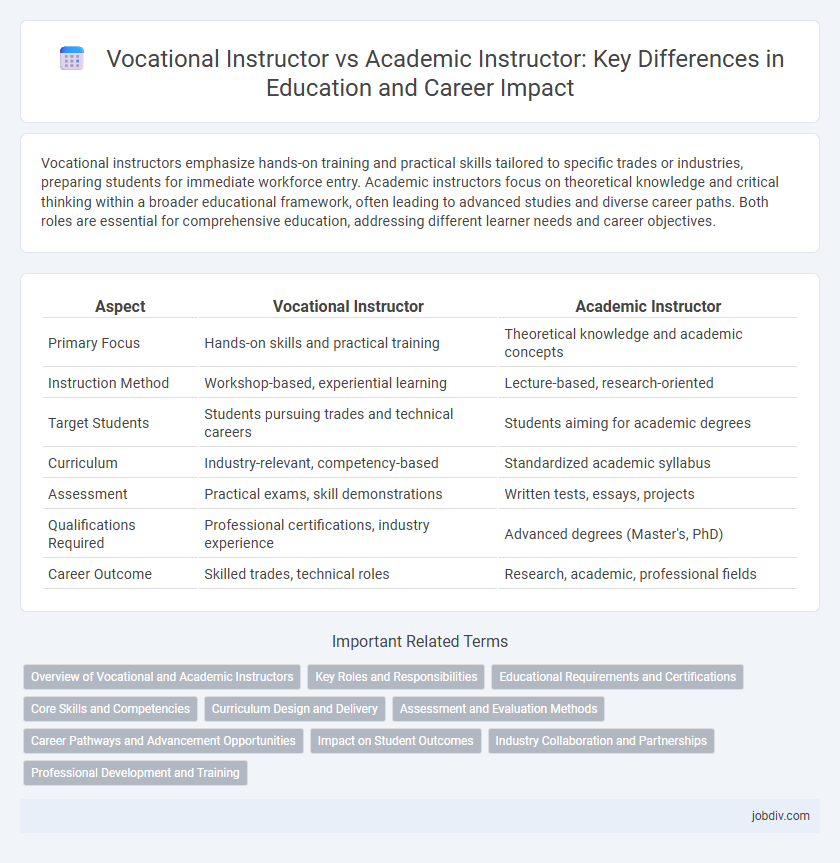Vocational instructors emphasize hands-on training and practical skills tailored to specific trades or industries, preparing students for immediate workforce entry. Academic instructors focus on theoretical knowledge and critical thinking within a broader educational framework, often leading to advanced studies and diverse career paths. Both roles are essential for comprehensive education, addressing different learner needs and career objectives.
Table of Comparison
| Aspect | Vocational Instructor | Academic Instructor |
|---|---|---|
| Primary Focus | Hands-on skills and practical training | Theoretical knowledge and academic concepts |
| Instruction Method | Workshop-based, experiential learning | Lecture-based, research-oriented |
| Target Students | Students pursuing trades and technical careers | Students aiming for academic degrees |
| Curriculum | Industry-relevant, competency-based | Standardized academic syllabus |
| Assessment | Practical exams, skill demonstrations | Written tests, essays, projects |
| Qualifications Required | Professional certifications, industry experience | Advanced degrees (Master's, PhD) |
| Career Outcome | Skilled trades, technical roles | Research, academic, professional fields |
Overview of Vocational and Academic Instructors
Vocational instructors specialize in teaching practical skills and hands-on training tailored to specific trades or professions, emphasizing real-world applications and industry standards. Academic instructors focus on imparting theoretical knowledge and critical thinking within traditional academic subjects such as mathematics, sciences, and humanities. Both play essential roles in education, with vocational instructors preparing students for direct workforce entry and academic instructors laying the foundation for advanced study and intellectual development.
Key Roles and Responsibilities
Vocational instructors specialize in practical skills training and hands-on learning, preparing students for specific trades or professions through industry-relevant curricula and real-world applications. Academic instructors focus on theoretical knowledge, critical thinking, and subject mastery within disciplines like mathematics, science, and literature, emphasizing research, analysis, and academic standards. Both roles require effective communication, curriculum development, and student assessment, but vocational instructors prioritize competency-based education while academic instructors emphasize conceptual understanding.
Educational Requirements and Certifications
Vocational instructors typically require specialized certifications or licenses tailored to specific trades, such as OSHA certification for safety or industry-specific credentials, alongside practical experience in their field. Academic instructors usually hold advanced degrees like a master's or doctorate in education or their subject area, emphasizing theoretical knowledge and pedagogical skills. Certification for academic instructors often includes state-specific teaching credentials or professional certificates, ensuring compliance with educational standards and instructional quality.
Core Skills and Competencies
Vocational instructors demonstrate expertise in hands-on skills, industry-specific knowledge, and practical training methods essential for workforce readiness. Academic instructors excel in theoretical knowledge, curriculum development, research skills, and critical thinking to foster intellectual growth. Both roles require strong communication, adaptability, and assessment abilities tailored to their distinct educational goals.
Curriculum Design and Delivery
Vocational instructors design curricula focused on hands-on skills and industry-specific competencies, integrating practical training with real-world applications. Academic instructors develop theoretical and research-oriented curricula aimed at conceptual understanding and critical thinking within a discipline. The delivery by vocational instructors emphasizes experiential learning and competency assessment, whereas academic instructors prioritize lecture-based teaching and evaluation through examinations and essays.
Assessment and Evaluation Methods
Vocational instructors primarily use practical, skills-based assessments such as hands-on projects, simulations, and competency checklists to evaluate students' job readiness and technical proficiency. Academic instructors favor theoretical evaluations like written exams, essays, and standardized tests to measure knowledge retention and critical thinking skills. Both roles incorporate formative assessments but differ significantly in emphasis, aligning vocational methods with industry standards and academic ones with curriculum guidelines.
Career Pathways and Advancement Opportunities
Vocational instructors specialize in hands-on training for specific trades, offering direct pathways to skilled careers in industries like healthcare, automotive, or information technology, with advancement opportunities including master technician or program coordinator roles. Academic instructors focus on theoretical knowledge and broader educational foundations, often leading to career advancement through research, tenure, or administrative positions in schools and universities. Both career pathways support professional growth, but vocational routes emphasize practical expertise and industry certifications, while academic tracks prioritize advanced degrees and scholarly achievements.
Impact on Student Outcomes
Vocational instructors enhance student outcomes by providing hands-on training tailored to specific trades, increasing job readiness and practical skills application. Academic instructors focus on theoretical knowledge and critical thinking, fostering long-term cognitive development and adaptability across disciplines. Combining both instructional methods can significantly improve overall student engagement and career success.
Industry Collaboration and Partnerships
Vocational instructors emphasize close collaboration with industry partners, facilitating hands-on training and apprenticeships that align directly with workforce needs. Academic instructors engage with educational institutions and research bodies, fostering partnerships that support theoretical knowledge and curriculum development. Effective industry collaboration for vocational instructors enhances employability through practical skills, while academic instructors contribute to innovating educational standards and policy frameworks.
Professional Development and Training
Vocational instructors prioritize hands-on training and industry-specific skills development, ensuring learners acquire practical expertise required for immediate workforce integration. Academic instructors focus on theoretical knowledge and research methodologies that build critical thinking and foundational understanding within their disciplines. Professional development for vocational instructors often includes updating technical competencies and industry certifications, while academic instructors engage in ongoing scholarly research, curriculum development, and pedagogical training to enhance teaching effectiveness.
Vocational Instructor vs Academic Instructor Infographic

 jobdiv.com
jobdiv.com